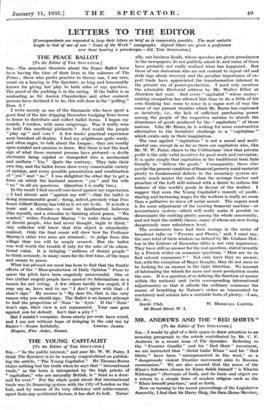THE YOUNG CAPITALIST
{To the Editor of THE SPECTATOR.] SIR,—" In the public interest," and pace Mr. W. W. Paine, I think The Spectator is to be warmly congratulated on publish- ing the article, " The Young Capitalist." Mr. Thomas Burns states nothing but the truth when he says that " international trade," as the term is interpreted by the high priests of capitalism," who are naturally British, is " dead as a door- nail for ever." For the whole point about that international trade was its financing system with the City of London as the hub, and by reason of its very efficiency and achievement, apart froM any accidental factors, it.has shot its holt. Natur-
ally, our business heads, whose speeches are given prominence in the newspapers, do not publicly admit it, and many of them have probably not really realized what has happened. But those of our statesmen who are not content to repeat old and stale tags about recovery and the peculiar importance of ex-' port trade have appreciated the transformation inherent in the present era of power-production. I need only mention the admirable Rectorial address by Mr. Walter Elliot at Aberdeen last year. And every " capitalist " whose money- making occupation has allowed him time to do a little of his own thinking has come to sense in a vague sort of way the cause of our present troubles which Mr. Burns his expressed so incisively, i.e., the lack of sufficient purchasing power among the people of the respective nations to absorb the abundance of goods produced by the " capitalists " of those nations. Like Mr. Burns, he is seeking for some constructive alternative to the Socialists' challenge to a " capitalism which exists only in their imagination.
The case against " capitalism " is not a moral and senti- mental one, except in so far as there are capitalists who, like Mr. W. W. Paine, cleave to the Utilitarians' view that private profit is the-only valid incentive for good work and enterprise.. It is quite simply that capitalism in the traditional form fails literally to " deliver the goods." Consequently, those who ascribe the present condition of financial poverty amid material plenty to fundamental defects in the monetary system are surely much nearer the mark than the average teacher and preacher of the Left still imbued with a desire to redress the balance of this world's goods in favour of the worker. I suggest that even the Young Capitalist's remedy of profit- sharing and increasing wages for the workers is really no more than a palliative to stave off social unrest. The urgent need is for some adjustment of the existing financial machine—or accountancy system—which will really make it possible to disseminate the existing plenty among the whole community, and not least the middle classes, many of whom are now living dangerously near subsistence level.
The economists have had their innings in the series of broadcast talks on " Poverty and Plenty," and, I must say, the sum total of their wisdom (as defined by Mr. Graham Hut. ton in the Listener of December 26th) is not very impressive. They have still no answer for the real question, stated recently by a French writer on economic questions, " How are we to find solvent consumers ? " Not only have they no answer, but, with the exception of Major Douglas, they do not seem to be looking for an answer in the right direction. No amount of lubricating the wheels for more and more production meets the case. It is a question of re-defining the function of money within the national unit (with corresponding international adjustments) so that it affords the ordinary consumer the means of benefiting by Nature's riches as transmuted by machinery and science into a veritable horn of plenty.—I am, Sir; &e.,






































 Previous page
Previous page